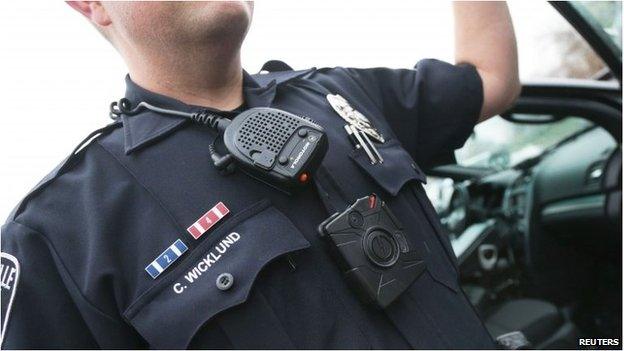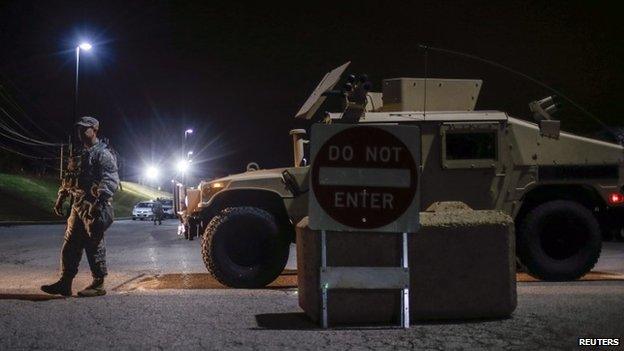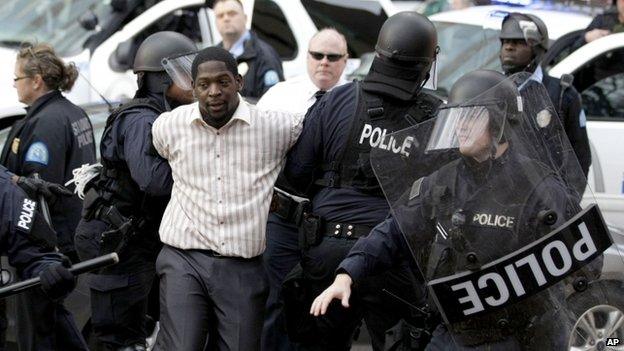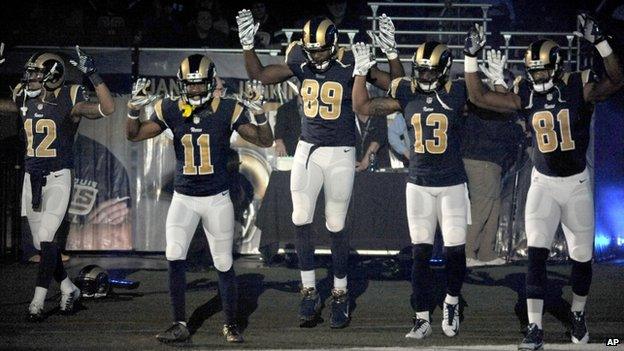Obama asks Congress to fund 50,000 police body cameras
- Published
Protests have spread across the US over perceived policing injustices
US President Barack Obama has requested $263m (£167m) to improve police training, pay for body cameras and restore trust in policing.
Mr Obama asked Congress for the funds after a week of nationwide protests over perceived policing injustices.
Ferguson in Missouri was rocked by riots after a grand jury decided not to charge a white police officer in the fatal shooting of an unarmed black man.
Protests spread across the US and a mass walkout was held on Monday.
Students and workers held a lunchtime protest in several cities to highlight the issue.
"This is not a problem just of Ferguson, Missouri. This is a national problem, Mr Obama said. "But it's a solvable problem."

Post-Ferguson plan

more appropriate use of military equipment by police
50,000 body cameras (pictured above) to record interactions
task force to build a "sustained conversation" across the US

The president spoke after a day of meetings with mayors, civil rights leaders and law enforcement officials at the White House.
They discussed a programme that currently provides redundant US military tactical gear to local police departments, free of charge.
Mr Obama said he has asked federal agencies for recommendations to ensure the programme is not building a "militarised culture" in domestic police forces.
Police in Ferguson, Missouri, were criticised for being heavy-handed in dealing with protests sparked by the shooting of Michael Brown in August.


Protests engulfed Ferguson following a grand jury decision not to indict
The funds requested by Mr Obama would be spread over three years and some of the money will go towards purchasing 50,000 body cameras for police officers as well as resources to reform law enforcement departments.
Body cameras can provide evidence of encounters between police and civilians, particularly in disputed cases such as the Ferguson shooting.
The president said the stories of discrimination that young people had told him at the White House on Monday "violate my belief about what America can do".
He also unveiled a taskforce on modern policing, to be chaired by Philadelphia police commissioner Charles Ramsey.

Members of the St Louis Rams football team raised their hands in protest of events in nearby Ferguson
Also on Monday, a commission tasked with making recommendations on issues stemming from the fatal shooting has convened in Ferguson.
The 16-member panel, stood up by Missouri Governor Jay Nixon, will consider changes in areas including public interaction with law enforcement and community stability.
The officer who shot Brown in Ferguson, Darren Wilson, resigned from the force over the weekend.
The decision not to charge Mr Wilson days earlier triggered a nationwide debate over relations between black communities and law enforcement.
The policeman said he had feared for his life.
Brown's supporters said the teenager was attempting to surrender when he was shot. Some witnesses said the 18-year-old, who was unarmed, had his hands up.